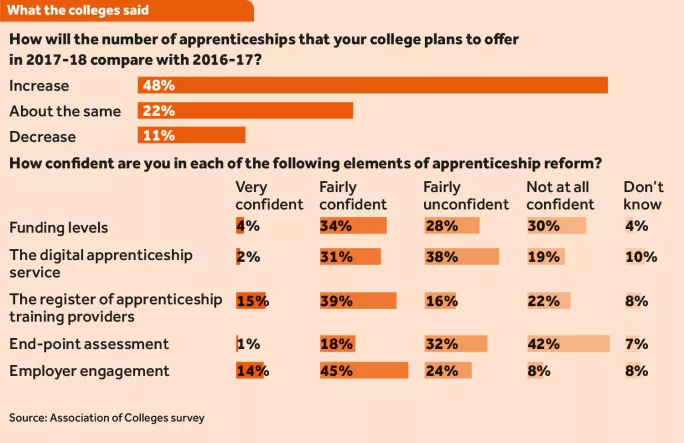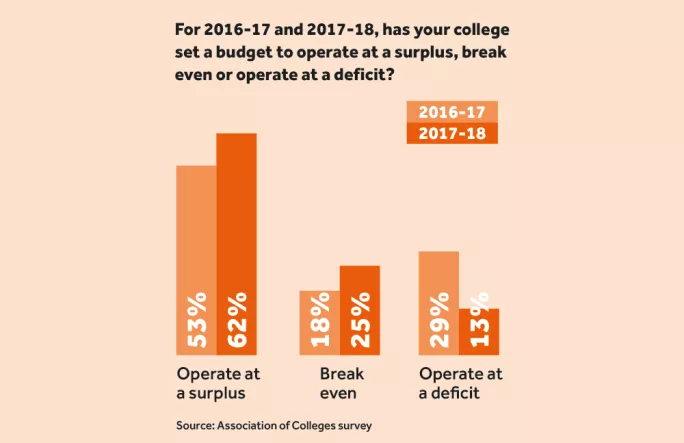College finances improve after ‘period of stability’

The financial pressure that the colleges sector was under last year was revealed by an Association of Colleges survey in partnership with Tes. A fifth of colleges were budgeting to operate a deficit in 2016-17, and nearly a third expected compulsory redundancies in the next 12 months, the figures showed.
Today, Tes can reveal that this year’s survey paints a different picture. Only 13 per cent expect to operate a deficit in 2017-18, and almost two-thirds of colleges say they have set a budget to operate at a surplus.
Julian Gravatt, deputy chief executive of the AoC, says that the improvement in the financial position of colleges has partly been down to the fact that there has been “slightly more stability from the government”. Restructuring costs are also having less of an impact, he explains.
The survey is not all positive news, however: the proportion of colleges expecting to make compulsory redundancies has remained at around a third, and 56 per cent expect to restructure their workforce. Future funding levels are also the number one concern.
To improve their financial health, colleges either have to cut costs or increase income. And one area that many see as harbouring major growth potential is apprenticeships.

The AoC survey, to which around a third of English colleges responded, shows that just over a third feel there has been at least some positive impact on their apprenticeship offer from government reforms. Meanwhile, 48 per cent believe that the number of apprenticeships their college offers will grow in 2017-18, compared with 2016-17.
However, the survey also highlights a number of barriers that could prevent the sector growing its apprenticeship offer. Over half of colleges say there are not enough suitable candidates, and a similar proportion stress that there are insufficient numbers of employers prepared to offer apprenticeships.
College leaders admit they lack confidence in crucial parts of the government’s apprenticeship reform, with 42 per cent saying they are not at all confident in end-point assessment - the new assessment that apprentices have to pass - while 30 per cent have no confidence in funding levels. Claire Foster, vice-principal at Grimsby Institute, says she believes that most of the growth potential for her college is around higher and degree-level apprenticeships.
However, she adds: “We have concerns around how things like the end-point assessment will work out. A lot of our small employers don’t yet fully understand the benefit of having apprenticeships. And, indeed, even some of our bigger employers are not sure how best to utilise their levy.”

Ian Pretty, chief executive of the Collab Group network of colleges, says of apprenticeships: “It is a huge opportunity. The way I would see FE becoming very successful is through working collaboratively to talk to clients.” Unlike many providers, colleges can deliver a rounded service, which can include support on HR and recruitment, he says.
Mr Gravatt argues that the potential of apprenticeships for the sector goes beyond just income growth. “They are a government priority, and apprenticeships on their own are not going to make colleges financially better off,” he explains. And Martin Tucker, director of Truro and Penwith College in Cornwall, agrees. “If you look at the county we serve, we want to give them as complete an offer as possible. We are certainly not into apprenticeships for a solely financial gain,” he says.
You need a Tes subscription to read this article
Subscribe now to read this article and get other subscriber-only content:
- Unlimited access to all Tes magazine content
- Exclusive subscriber-only stories
- Award-winning email newsletters
Already a subscriber? Log in
You need a subscription to read this article
Subscribe now to read this article and get other subscriber-only content, including:
- Unlimited access to all Tes magazine content
- Exclusive subscriber-only stories
- Award-winning email newsletters